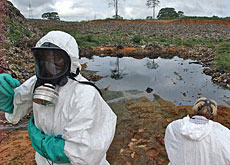Asbestos impasse “tragic for public health”

Chrysotile asbestos will remain off a global "watch list" of toxic substances for at least two years after countries led by Canada blocked consensus in Geneva.
A Swiss official told swissinfo he was disappointed but said it was not the end of the process. The International Ban Asbestos Secretariat disagreed and called the failure to act “truly tragic”.
Chrysotile asbestos is a known human carcinogen which represents 94 per cent of world asbestos consumption.
Parties to the Rotterdam Convention, an international treaty governing trade in toxic substances, failed on Friday to agree to add chrysotile asbestos to a list of 39 chemicals and pesticides that exporting countries must inform importers about before shipping.
“It’s not positive that we don’t have a decision concerning chrysotile asbestos here in Geneva, but on the other side, it always takes a long time in a multilateral process before you achieve anything,” Thomas Kolly, head of international affairs at the Federal Environment Office, told swissinfo.
“I wouldn’t say it is the end of the Rotterdam Convention, certainly not.”
But Laurie Kazan-Allen, from the International Ban Asbestos Secretariat, said she had “no doubts” that this was the end of the treaty.
“Everyone knows that the [asbestos] issue is pivotal,” she told swissinfo.
Opposition
Once used widely as an insulating and fireproofing agent in buildings, ships and consumer products, asbestos has been shown to cause cancers of the lung and other organs as well as breathing disorders.
The World Health Organization estimates at least 90,000 people die every year from asbestos-related diseases.
Canada, whose French-speaking Quebec province is a major asbestos producer and exporter, led opposition to the addition of chrysotile asbestos to the list, according to environmentalists tracking the talks.
Several developing countries including Kyrgyzstan, Ukraine and India also spoke against the addition of asbestos, largely due to concerns that tighter trade rules would lead to pressure for stricter domestic regulations.
Countries will revisit the asbestos issue at a 2008 meeting of the Rotterdam Convention signatories, where they will also consider the addition of tributyl tin, used in paints for ship hulls, and the insecticide endosulfan.
“Murder”
“At least 200,000 workers will be killed by asbestos disease before the proposal to list asbestos can be tabled again,” said Kazan-Allen.
“If someone has HIV/Aids and they have unprotected sex, in a lot of jurisdictions that’s considered attempted murder. Why is this different? The Rotterdam Convention is supposed to ensure that importing countries have informed consent.
“What the Canadians are trying to do – what they’re all trying to do – is delay this as long as they can so they can make as much money as they can.”
Kazan-Allen said that for every worker in the Canadian asbestos industry, two people die every year.
“For public health worldwide this is truly tragic. It’s also very sad that a multilateral environmental agreement which had so much promise has been brought to its knees by people who are more interested in the pennies in their pockets than the number of people dying.”
swissinfo, Thomas Stephens
The permanent seat of the Rotterdam Convention is shared between Geneva and the Italian capital, Rome.
There are 39 chemicals listed in the convention and subject to the PIC procedure, including 24 pesticides, four severely hazardous pesticide formulations and 11 industrial chemicals. Many more chemicals are expected to be added in the future.
Five forms of asbestos – actinolite, anthophyllite, amosite, crocidolite and tremolite – are already on the PIC list. The inhalation of some kinds of asbestos fibres can cause various serious illnesses, including cancer.
Earlier this year the International Labour Organization adopted a resolution calling for the elimination of all uses of chrysotile.
The Rotterdam Convention was adopted in September 1998.
Switzerland ratified the treaty in January 2002.
The convention finally came into force in February 2004.

In compliance with the JTI standards
More: SWI swissinfo.ch certified by the Journalism Trust Initiative











You can find an overview of ongoing debates with our journalists here . Please join us!
If you want to start a conversation about a topic raised in this article or want to report factual errors, email us at english@swissinfo.ch.